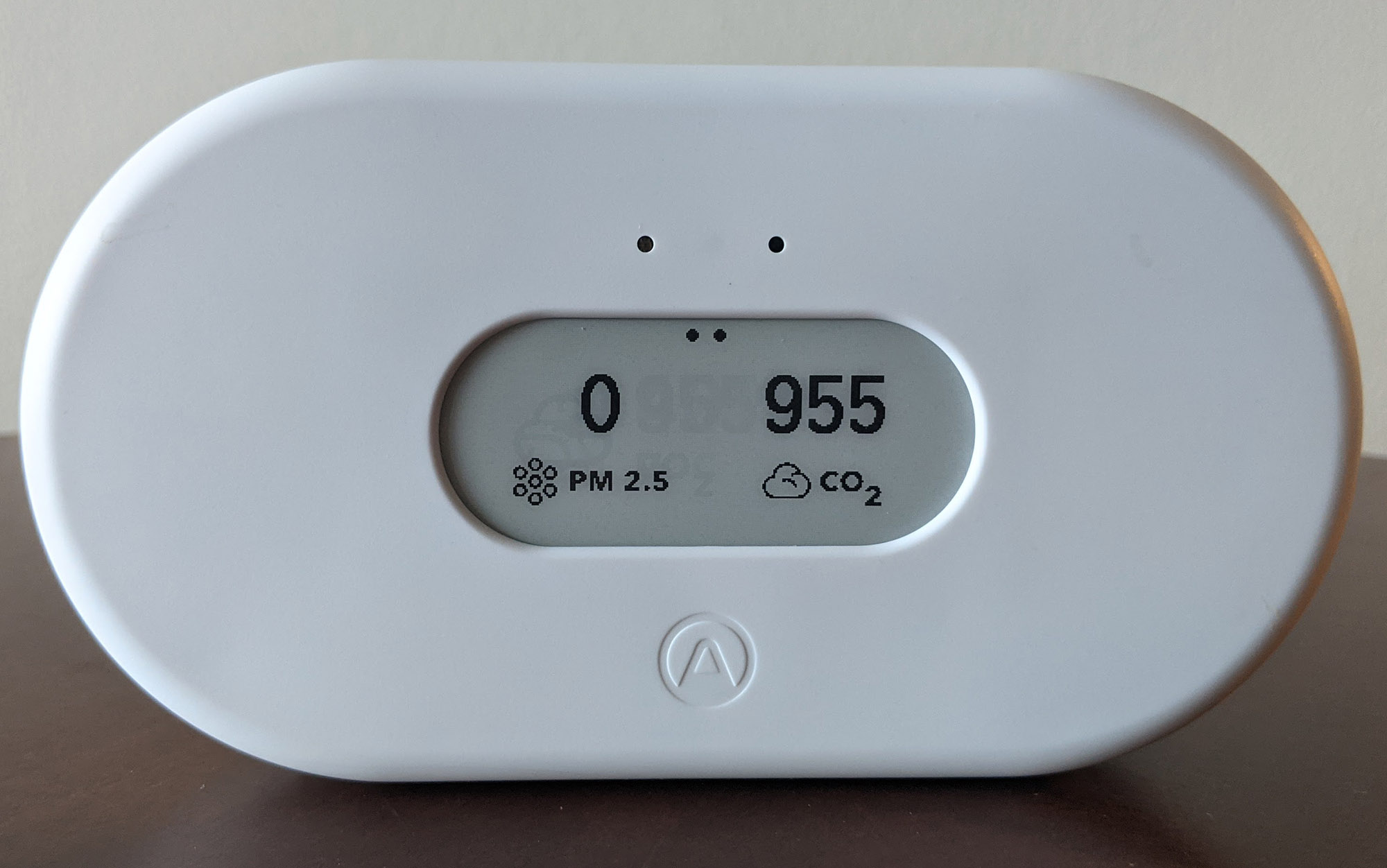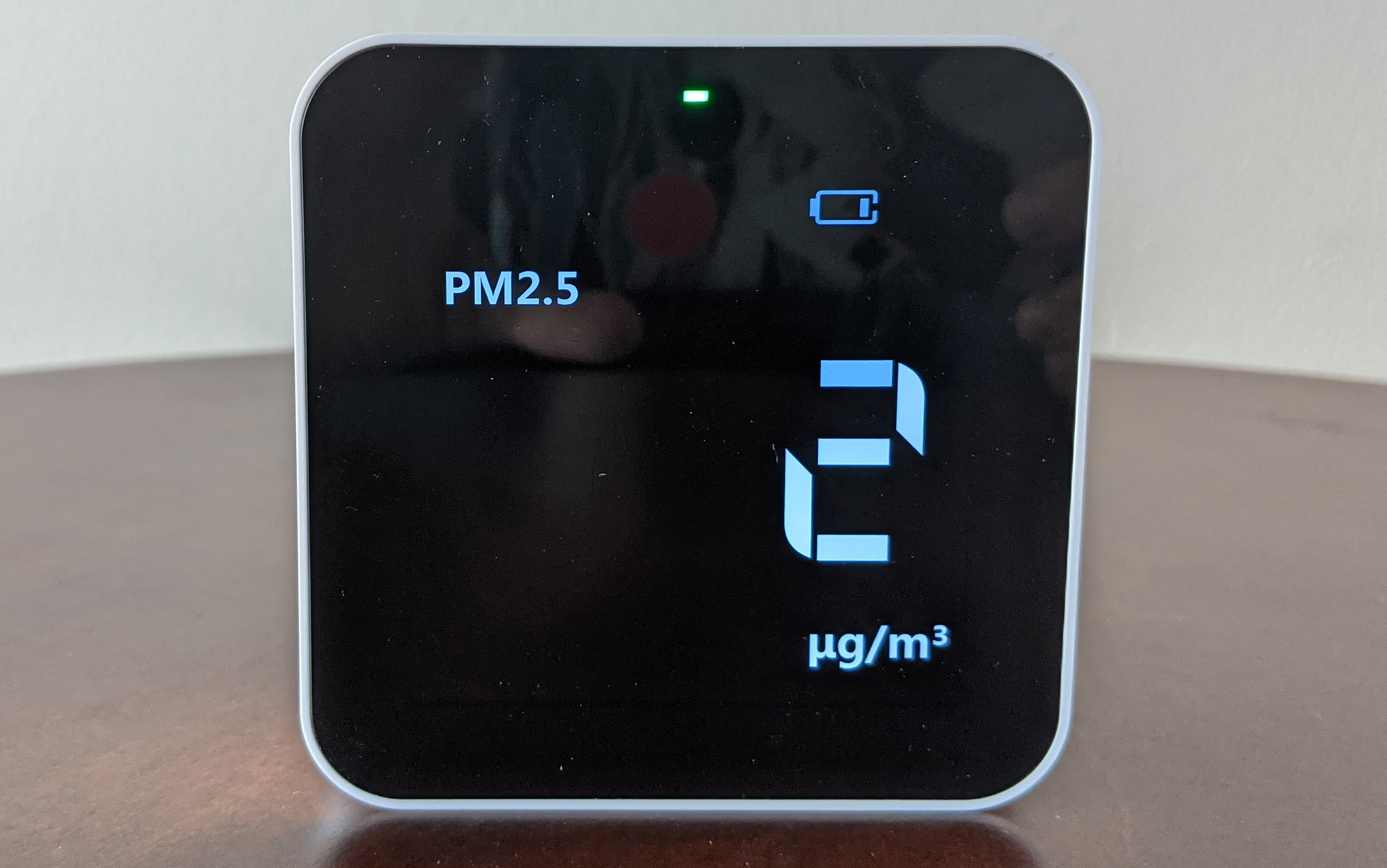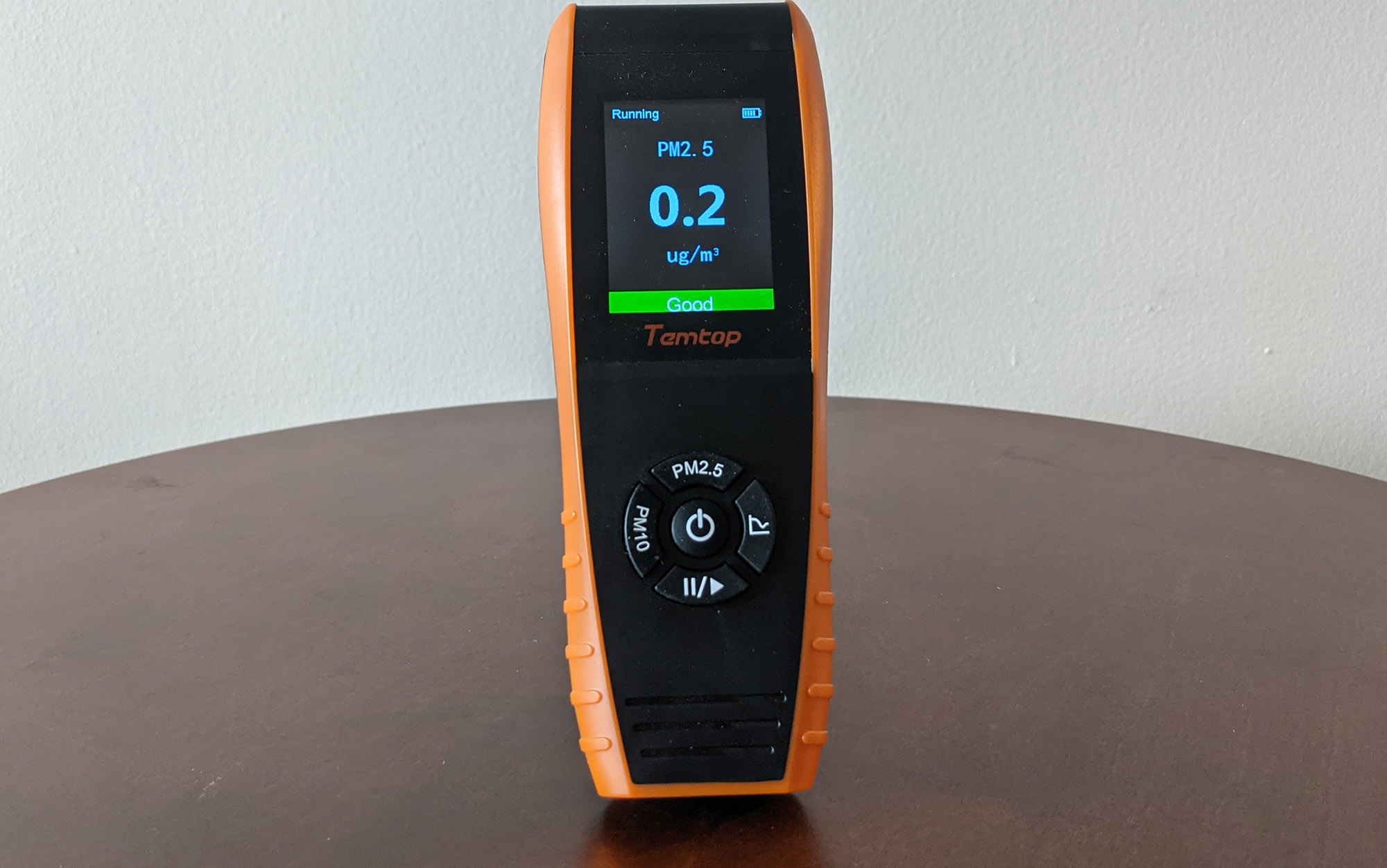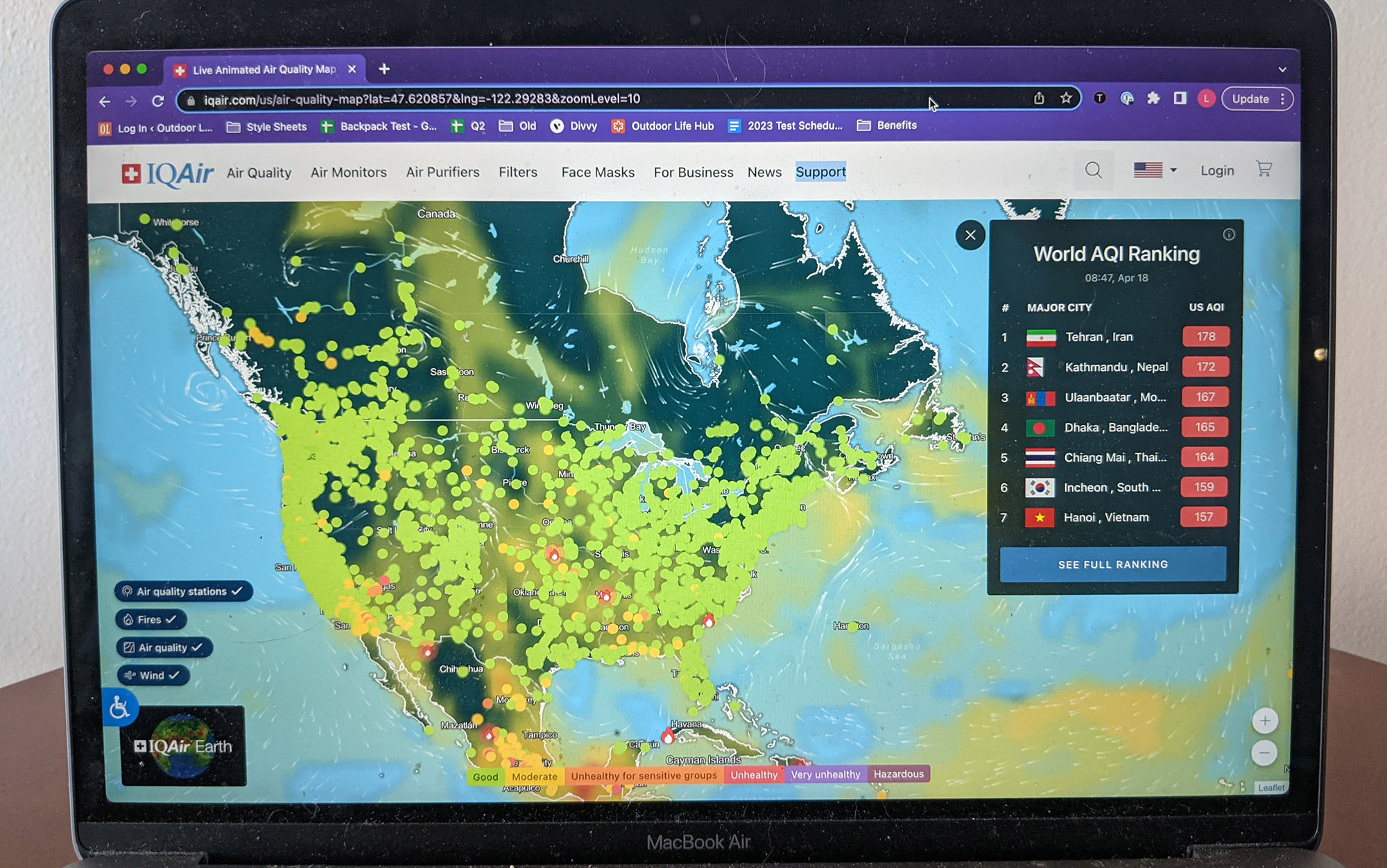We may earn revenue from the products available on this page and participate in affiliate programs. Learn More ›
Published Apr 19, 2023 2:28 PM
Spend enough time in a backcountry cabin or an adventure van, the air turning hazy with smoke from the wood-burning stove, massive tufts of pollen drifting through the air, and the need for an air quality monitor becomes apparent. That goes double for the West, where checking the air quality forecast has become routine during the drier months of the year. To help you choose the best air quality monitor for your next adventure, we reviewed several top models.
Things to Consider Before Buying an Air Quality Monitor
PM 2.5 and PM 10
Particulate matter (PM) 2.5 and 10 are the most important measurements provided by your air quality monitor. The 2.5 and 10 here refer to the width of the particulates in micrometers. For example, PM 50 is about the width of a human hair. PM 10 is the width of dust, mold, and pollen. PM 2.5 is the width of soot, and is the most applicable measurement for those worried about the effects of wildfire smoke.
Carbon Monoxide
None of the air quality monitors I looked at for this test included a sensor for carbon monoxide, which poses a serious health risk, even death, if high levels are reached. If you do not already have one, be sure to install one following the EPA’s guidelines.
Carbon Dioxide
CO2 levels can skyrocket surprisingly fast in closed environments with multiple people. Add on smoking or a wood-burning stove and levels can reach unsafe conditions surprisingly fast. While the levels necessary to create an immediate health risk are extremely high, lower levels can cause drowsiness or cognitive impairment. Currently there are no recommended guidelines for safe levels of CO2 in a living or sleeping environment, but OSHA does recommend that levels stay below 5,000 parts per million for work environments.
VOCs
You can think of VOCs (volatile organic compounds), also called TVOCs (total volatile organic compounds), as the chemicals in the air of your home. Formaldehyde and benzene are both examples of VOCs, although there are many others. Sources can be found throughout the home, including paints, cleansers, disinfectants, moth repellents, air fresheners, hobby supplies, and dry-cleaned clothing. According to the EPA, high levels of VOCs can result in eye, nose, and throat irritation, headaches, loss of coordination, nausea, as well as damage to the liver, kidney, and central nervous system. It is also suspected that high VOC exposure may be correlated with cancer.
Other Considerations
Individuals in older homes may also want to look for air quality monitors that can detect radon, which seeps into the basements as naturally occurring uranium breaks down in the soil surrounding it. If you live in a humid or otherwise wet part of the country, it may be worth finding out if any of the naturally occurring mold around you carries a significant health risk. While some air quality monitors advertise they are able to detect mold specifically (as opposed to PM 10 detection more broadly), these were not evaluated as a part of this test.
How I Tested the Best Air Quality Monitors
To test the air quality monitors, I first set them up in different rooms in my home and assessed how easy the information they provided was to understand and how they impacted my day-to-day awareness of the air quality in my home. Needless to say, I open up windows a lot more now than I did previously. To confirm that the air quality monitors were indeed capable of detecting PM 2.5 levels I lit matches in an enclosed space to see how it affected the reading. (I did not separately test the PM 10 sensor as most individuals will be more concerned with PM 2.5 due to its correlation with smoke and soot.) For VOCs, I opened up cleaning supplies and craft glue and left it in an enclosed space for one hour. CO2 level sensors were tested over a series of days by noting how they changed when a window was open and when more people were in an enclosed space for a duration of time. I also compared the humidity and temperature sensors to existing humidity and temperature sensors in my home.
Finally, I considered cost, battery life, energy consumption, and the ability of the air quality monitor to work with an app versus as a standalone.
Best Air Quality Monitors: Reviews & Recommendations
Best Overall: Awair Element
Key Features
- No internal battery, uses a USB-C cord
- Measures temperature, humidity, CO2, VOCs, and PM 2.5
- Connects to a smartphone app
Pros
- Easy to see at-a-glance what your air quality is
- Measures air quality indicators most applicable to campervans and cabins
- Strong performance during testing
Cons
- Must be plugged in to operate
This was by far my favorite air quality monitor to use. With other air quality monitors, I had to look at each individual measurement to assess if I needed to open a window, a cleaning supply had caused the VOCs in my home to skyrocket, or something was starting to burn on the stove. But the streamlined Awair Element was easy to read at a glance. The interface provides both an overall number—think of this as the grade the air in your home is getting—as well as a simplified bar graph at the bottom showing the temperature, humidity level, CO2, VOCs, and PM 2.5. An associated app, which was easy to set up, shows the exact percentages and quantity of each measurement.
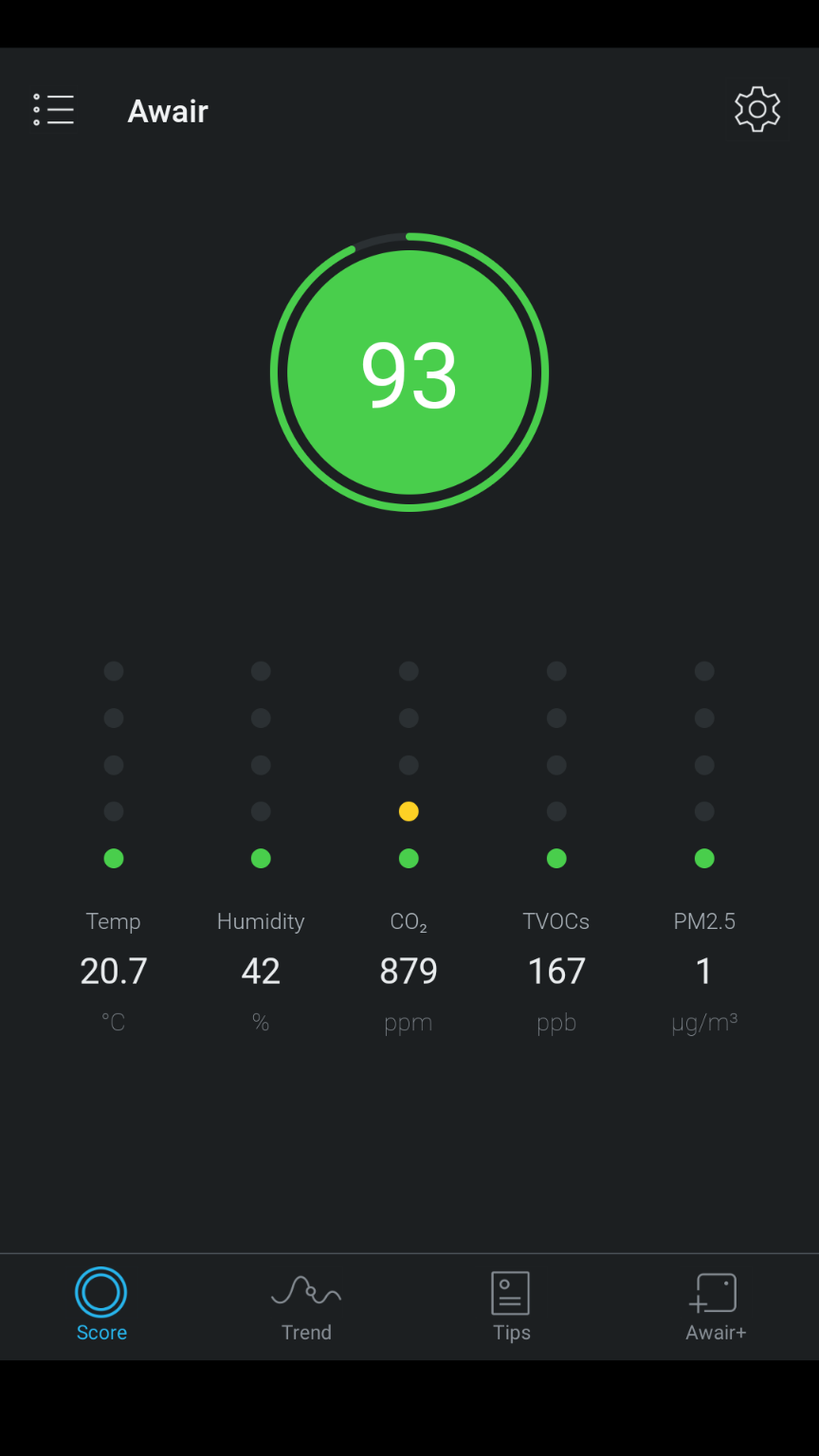
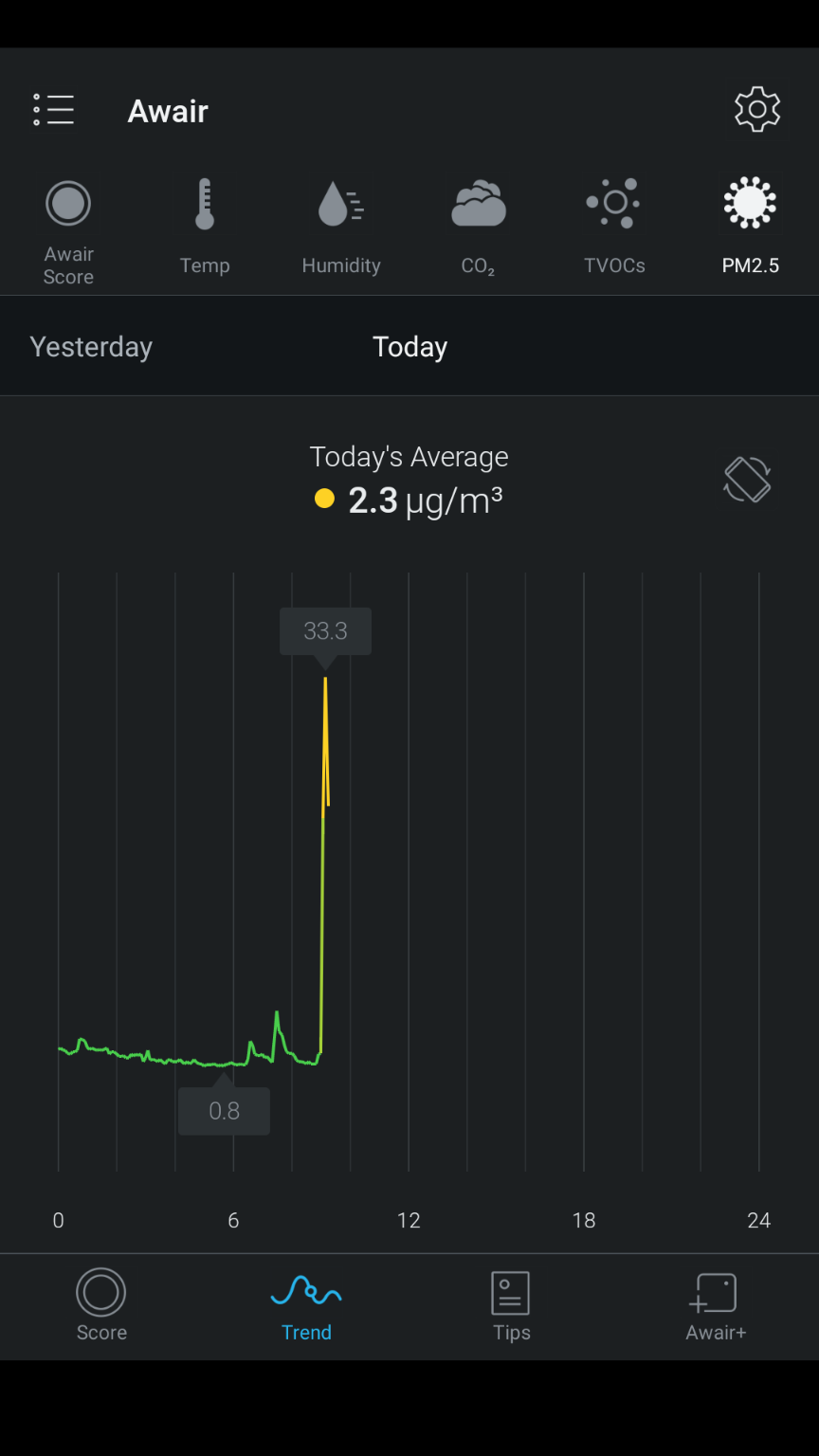
During testing, it was just behind the Temtop Air Quality Monitor Professional in registering changes to the PM 2.5 level, noting the change in air quality swiftly without jumping around. It also had a more accurate humidity reading than the Airthings View (important for anyone concerned about mold). When measured it took just 1 watt to operate, making it a reasonable choice for hooking up to one of the best power banks for camping.
Most Versatile: Airthings View
Key Features
- Both battery and USB-C option
- Measures temperature, humidity, radon, PM 2.5, PM 1, CO2, and VOCs
- Connects to a smartphone app
Pros
- Extremely long battery life
- Tests more pollutants than anything else I looked at
- Lots of customization possible
- Able to set up alerts
Cons
- Expensive
- Less intuitive user interface than my best overall pick
- Took the longest to note the change to PM 2.5 of anything in my test
There were a few things I really liked about the Airthings View. The first is its battery life. While you can plug this air quality monitor into the wall using a USB-C cord, it can also be powered via six AA batteries (which are included). When I received this air quality monitor in the mail about three weeks ago, I set it up (including the online app) and turned it on, but did not plug it in using the USB-C wall charger. It’s still going strong. I’m assuming the battery will eventually give out, but if you’re looking for something that doesn’t need to be plugged in to work, this is a great option.
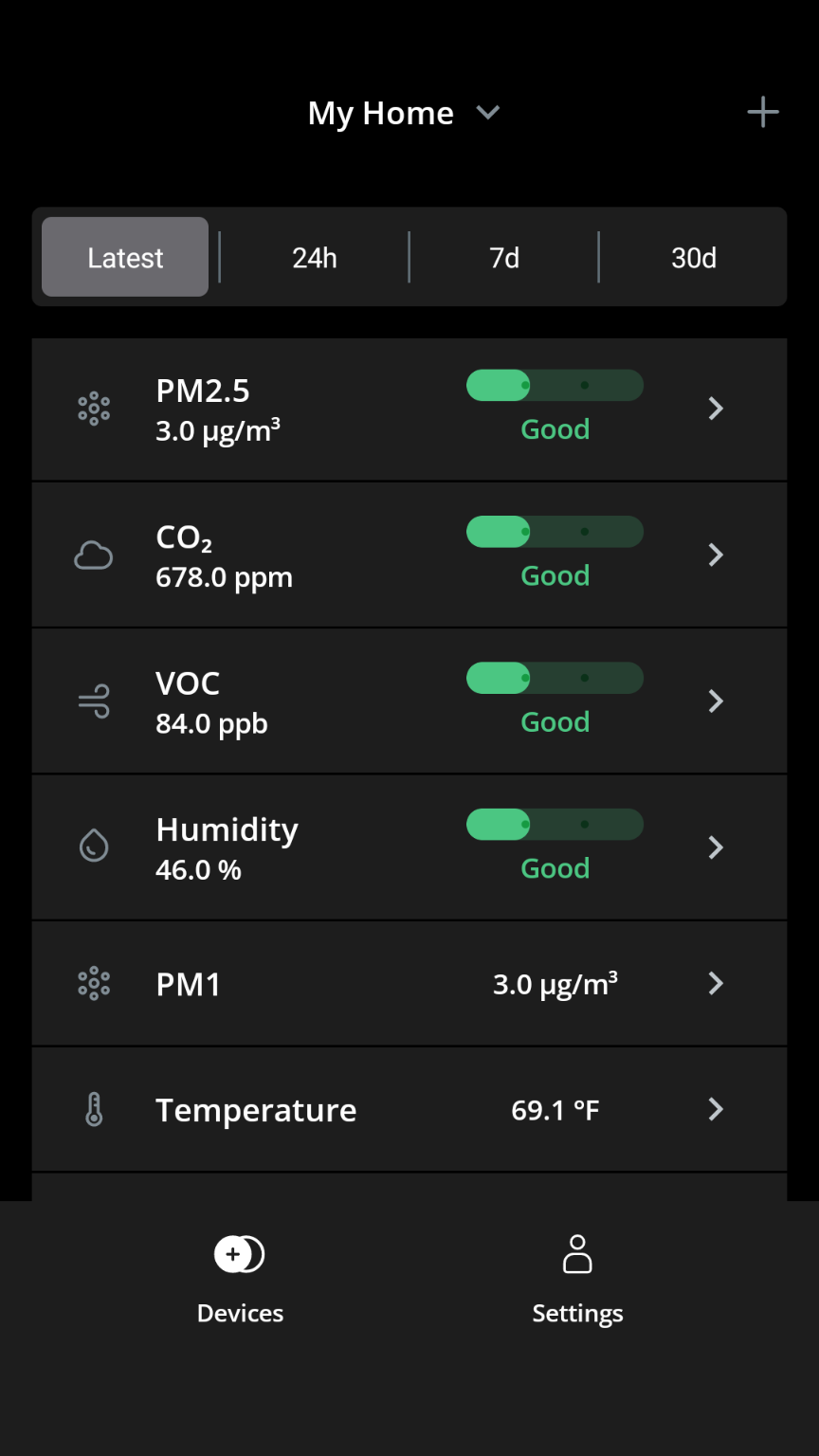
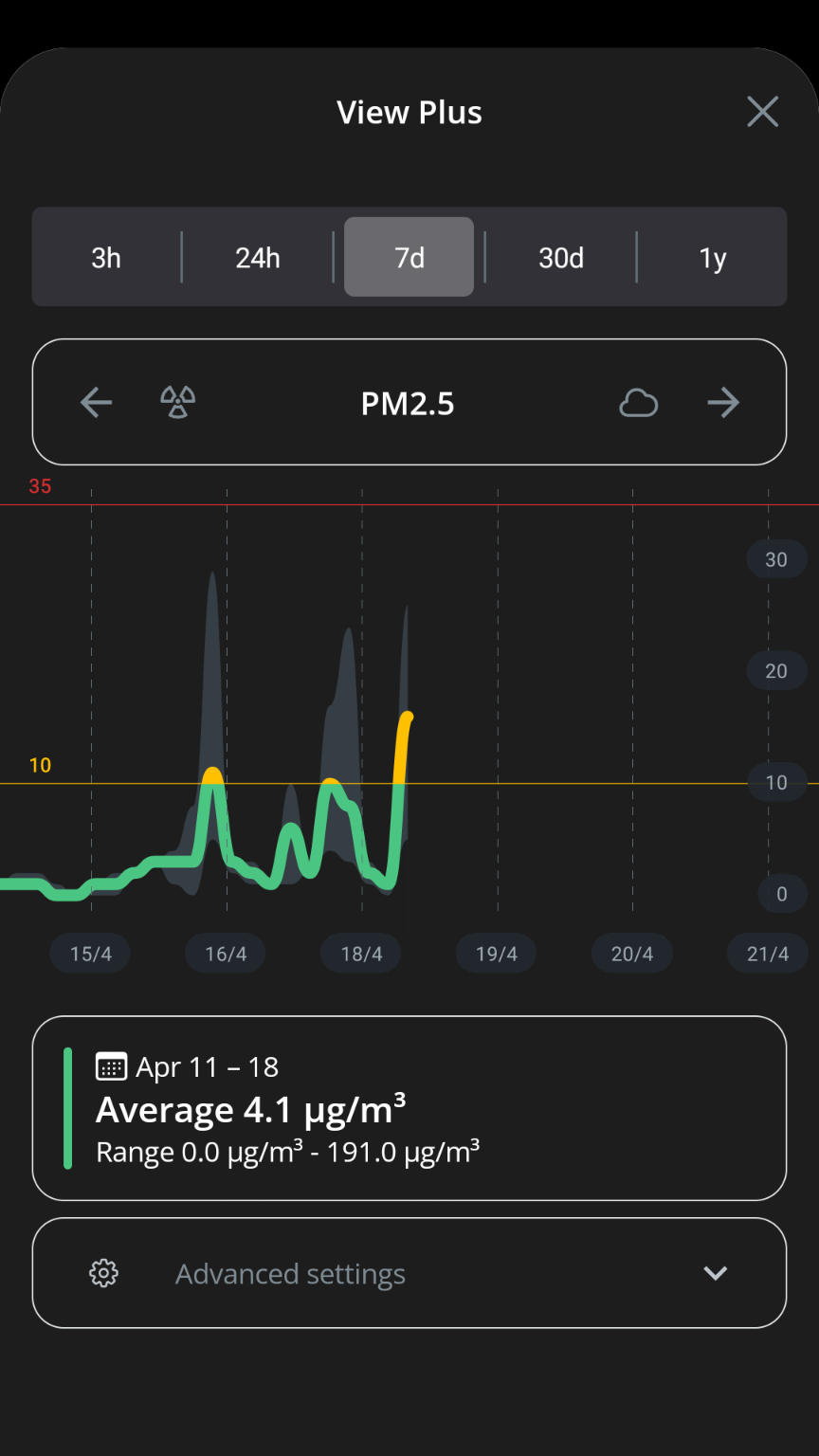
Like the Airwair Element, the app for the Airthings air quality monitor provides detailed information on the exact levels of its various measurements. The actual device, however, only shows you two of the measurements at a time (you can customize this to show the ones you are the most interested in). To see whether your overall air quality is good, you can either press the hidden button in between the two dots above the display screen or wave your hand in front of the device. A small black dot at the top of the screen means something about your current air quality is off, something it took me over two weeks to notice.
While I appreciate the extent of the potential customization with this device, I found that I preferred the Awair’s display, which shows you everything at a glance from across the room, over having to interact with the device or app every single time I wondered if it was time to open the windows. And, while the inclusion of the radon detection will undoubtedly be useful for individuals with a basement, my sense is that the PM 1 measurement is unlikely to get much use, as it closely mirrors the PM 2.5 reading.
It’s worth noting that during testing, the Airthings air monitor was the least reactive to changes in the PM 2.5 level (altered by lighting matches in a closed space over and over), taking nearly five minutes to register a change in air quality.
Best Budget: Temtop M10 Air Quality Monitor
Key Features
- Internal battery recharges via USB-A
- Measures PM 2.5, VOCs, and formaldehyde
- No accompanying app
Pros
Cons
- Very limited battery life (less than a day)
- Clunky user interface compared to other options on this list
- Readings jump around quite a bit which can be distracting
If your main air quality concern is smoke related, then the Temtop M10 Air Quality Monitor has got you covered. It provides you not only with a PM 2.5 measurement, but also with an AQI (air quality index) measurement. So if you know that your PM 2.5 levels bounce around a fair amount during the day—perhaps when you’re cooking—and you just want to know what your average air quality is, you can switch to this setting instead. It also measures VOCs and formaldehyde, specifically (which is a type of VOC).
That’s it. There’s no app. No overall air quality assessment. No CO2 levels. No humidity monitor.
During testing, the Temtop M10 Air Quality Monitor had a tendency to jump around quite a bit, skyrocketing from 2 PM 2.5 to 101 PM 2.5 (the highest levels reached) before settling back down. While the results it’s giving were close enough to accurate for most people’s purposes—alerting you to when it’s time to open or close the windows, for instance—it is visually distracting to look at, and may be perceived as stressful by some individuals.
Fastest Results: Temtop Air Quality Monitor Professional
Key Features
- Internal battery recharges via USB-A
- Measure PM 2.5 and PM 10
- No accompanying app
Pros
Cons
Let’s say you wake up one morning at your favorite off-grid campsite. You look outside your campervan and things look a little yellow. Is that a trick of the morning light? Or haze from a wildfire settling in? Rather than walk outside the campervan and take a few deep breaths—sending all that PM 2.5 straight in your lungs—to see if you can sniff out how bad the smoke is, you turn on your Temtop Air Quality Monitor Professional and get the answer in seconds.
During testing, it registered the change in PM 2.5 levels smoothly, steadily climbing as I lit match after match, and then falling slowly once I stopped.
Best Free: IQAir
Key Features
- Requires smartphone
- Measures PM 2.5 and ozone
- Requires internet connection
Pros
- Free
- No additional hardware needed
Cons
- Requires internet connection
- Only measures outdoor air quality
If you are going to be outside but not fully off-grid and you’d just rather not bother with another gadget in your arsenal, then I’ve got good news: You don’t need an air quality monitor. Both AirNow and IQAir provide real-time information about PM 2.5 (AirNow also records ozone).
If you have to choose one (and you really don’t), then I’d go with IQAir simply because they have more monitors (many of which are run on a volunteer basis if you are so inclined) in the areas of the country most prone to wildfire. If you’re near a city, it typically doesn’t make much difference, but when you’re far afield but closer to a wildfire than you’d like, it can provide a more accurate reading.
FAQs
Q: Do air quality monitors really work?
Air quality monitors do work, but not all provide the same amount of information. For instance, relatively few air quality monitors check for important issues to homeowners like mold and radon. Research the air quality issues you are most likely to encounter in your dwelling before making a purchase decision.
Q: What is the best way to monitor indoor air quality?
The best way to monitor indoor air quality is with an air quality monitor.
Q: Can an air quality monitor detect mold?
Most air quality monitors cannot detect mold. If you suspect you have a mold issue in your home, it’s best to contact an indoor air quality professional certified by the Indoor Air Quality Association (IAQA). They will be able to tell you if you have a mold issue in your home, and what remediation is recommended for the type of mold you have.
Why Trust Outdoor Life?
Since 1898, OL has been a leading authority in testing and reviewing hunting gear, fishing tackle, guns and shooting equipment, and much more. We have more than a century-long history of evaluating products, and we’re now bringing that expertise to online reviews. Our editors are experienced outdoorsmen and women, and most importantly, we’re trained journalists. We prioritize field testing and objective data when reviewing products. We conduct interviews with gear manufacturers and engineers as well as outdoor experts so that our readers have an understanding of how and why a product works—or doesn’t.
Advertising does not influence our gear reviews and it never will. While we always focus our coverage on standout products—because we want our readers to be aware of the latest and greatest gear—we also cover the flaws and quirks of any given product.
Final Thoughts
Safe, unpolluted air is essential for not only your long-term health, but also to ensure you are at the top of your game during your next outdoor adventure. Air quality monitors also pair well with one of the best home weather stations. If the air in your hunting cabin or sprinter van is starting to seem stale, smelly, or just plain off, then it’s time to invest in one of the best air monitors:

